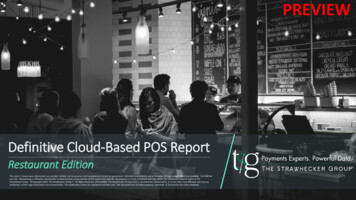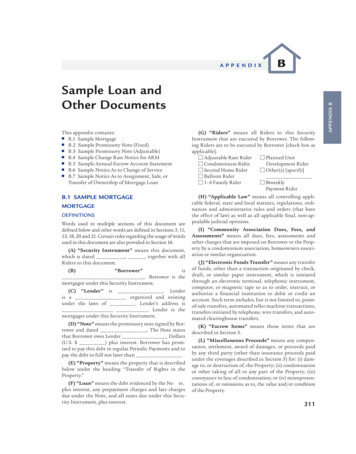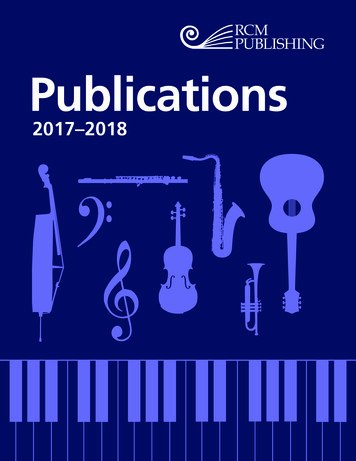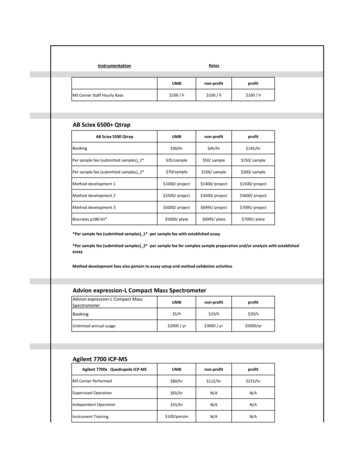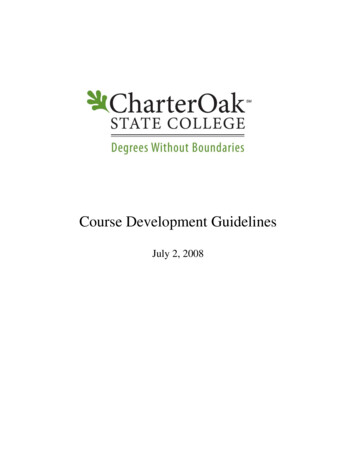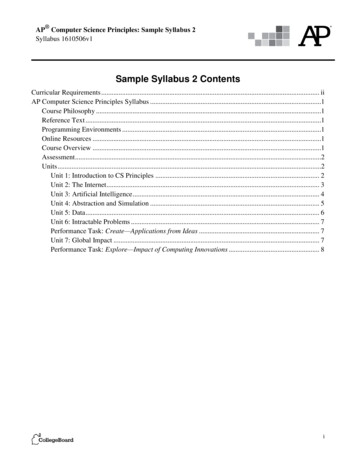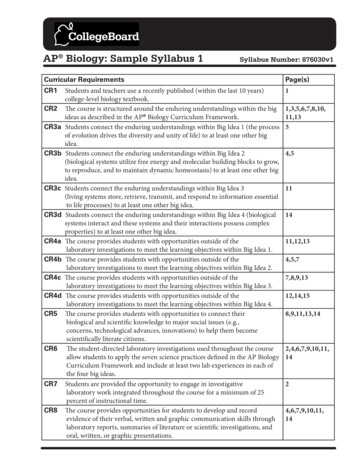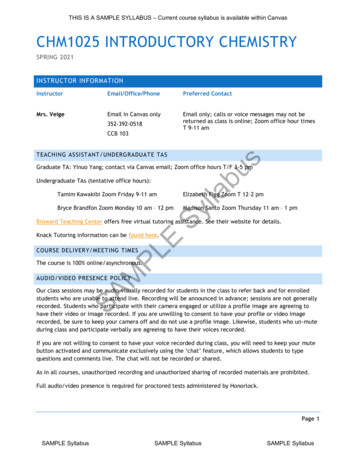
Transcription
THIS IS A SAMPLE SYLLABUS – Current course syllabus is available within CanvasCHM1025 INTRODUCTORY CHEMISTRYSPRING 2021INSTRUCTOR INFORMATIONInstructorEmail/Office/PhonePreferred ContactMrs. VeigeEmail in Canvas onlyEmail only; calls or voice messages may not bereturned as class is online; Zoom office hour timesT 9-11 am352-392-0518CCB 103SyllabusTEACHING ASSISTANT/UNDERGRADUATE TASGraduate TA: Yinuo Yang; contact via Canvas email; Zoom office hours T/F 3-5 pmUndergraduate TAs (tentative office hours):Tamim Kawakibi Zoom Friday 9-11 amBryce Brandfon Zoom Monday 10 am – 12 pmElizabeth Figg Zoom T 12–2 pmMadison Santo Zoom Thursday 11 am – 1 pmBroward Teaching Center offers free virtual tutoring assistance. See their website for details.PLCOURSE DELIVERY/MEETING TIMESEKnack Tutoring information can be found here.MThe course is 100% online/asynchronous.AUDIO/VIDEO PRESENCE POLICYSAOur class sessions may be audio-visually recorded for students in the class to refer back and for enrolledstudents who are unable to attend live. Recording will be announced in advance; sessions are not generallyrecorded. Students who participate with their camera engaged or utilize a profile image are agreeing tohave their video or image recorded. If you are unwilling to consent to have your profile or video imagerecorded, be sure to keep your camera off and do not use a profile image. Likewise, students who un-muteduring class and participate verbally are agreeing to have their voices recorded.If you are not willing to consent to have your voice recorded during class, you will need to keep your mutebutton activated and communicate exclusively using the ‘chat’ feature, which allows students to typequestions and comments live. The chat will not be recorded or shared.As in all courses, unauthorized recording and unauthorized sharing of recorded materials are prohibited.Full audio/video presence is required for proctored tests administered by Honorlock.Page 1SAMPLE SyllabusSAMPLE SyllabusSAMPLE Syllabus
THIS IS A SAMPLE SYLLABUS – Current course syllabus is available within CanvasGENERAL INFORMATIONCOREQUISITESMAC1147 or the equivalent is a published co-requisite. Refer to the Course Catalog for math requirementsto continue in general chemistry sequence. The math requirement of a C or higher in MAC1147 or theequivalent or higher is strictly enforced for CHM2045. A C or higher in CHM1025 is also required forprogression to CHM2045, no matter the ALEKS math placement score.DESCRIPTIONCHM 1025, a two-credit course, is offered for students who wish to strengthen their understanding of basicconcepts of atomic structure and stoichiometry before beginning the general chemistry sequence (CHM2045/2045L, CHM 2046/2046L). This introductory readiness course in general chemistry is for those withweak yet satisfactory backgrounds in high school chemistry and algebra. (P)SyllabusFIRST DAYSLog into Canvas and access the course. You should check daily for new Announcements and/or emailscontaining important information and reminders. Click on the Syllabus tab to review the due dates for allassignments for the entire term. Click on Modules and read all of the information under the Settling Insection. Many of your questions are answered in the Settling In section including: Which types ofcalculators are approved? What is Honorlock? What is ALEKS? How do you get help? Can assignments besubmitted late? What does the formula sheet for an exam look like?COURSE MATERIALSETEXTBOOKMPLA significant portion of your grade stems from electronic homework (ALEKS) associated with an ebook(Introduction to Chemistry, Bauer, Birk and Marks, 5th ed., McGraw-Hill). ALEKS also has its own“textbook,” the ALEKSPEDIA; the textbook for this course, however, is the Bauer text.SAYou can purchase one of two access codes for ALEKS. 1: The first includes ALEKS homework and the ebookof Bauer, Birk & Marks. 2: The second includes only the ALEKS homework for the course and theALEKSPEDIA reference material, and is not available at the UF Bookstore.This course is participating in UF All Access. Beginning the first day of the semester (not before that time)students can opt in to consent to have the purchase price charged to your student account. Alternatively,you can purchase an access code for the materials at the UF Bookstore. The opt-in code is thecomprehensive package (ALEKS homework and the ebook of Bauer, Birk & Marks).To opt in, navigate to: https://bsd.ufl.edu/allaccess. Click the “Opt In” tab or view the “View Eligible UFAll Access Classes” button. You will be prompted to log in using Gatorlink credentials. Follow the prompt toauthorize charges to your student account. The access code will then be provided. Copy the access code toyour clipboard. In the Canvas course, click on Modules, then select the link to ALEKS - Science to join theALEKS course. Provide the access code when prompted to do so. If you have any questions about theauthorization process or refunds contact allaccess@bsd.ufl.edu.Page 2SAMPLE SyllabusSAMPLE SyllabusSAMPLE Syllabus
THIS IS A SAMPLE SYLLABUS – Current course syllabus is available within CanvasA paperback version of the text is completely optional. The bookstore may stock paper versions of the text,or you can order one directly through ALEKS. A paper version is on reserve at the Marston Science Libraryfor reference purposes.See the ALEKS page in Canvas (Modules ALEKS, under the Settling In section) for a walkthrough video forinstructions on viewing the textbook and general navigation tips within ALEKS.WEBCAM/MICROPHONE/SPEAKERS/MIRRORYou are required to have a functioning webcam, microphone, and speakers for proctored exams. See theminimum technical requirements at honorlock.com/support. Ensure your computer system meets theirminimum system requirements. You are also required to have a handheld mirror/reflective surface forproctoring.COURSE TECHNOLOGYSyllabusAll UF students are expected to have reliable access to a computer, especially for an online course.Honorlock has specific hardware/software requirements: honorlock.com/support. Check the support pagefor ALEKS for technical support using their platform: https://mhedu.force.com/aleks/s/.COURSE COMMUNICATIONSGENERAL QUESTIONSGeneral course questions should be posted to the Q&A Discussion boards in Canvas. The instructor/TAresponse time is 24 h during the work week (expect to wait until Monday for questions posted on a Friday).PLEWe encourage you to post questions related to ALEKS homework or end of chapter questions you’re workingon to the Q&As. The homework isn’t meant to be a test, it’s a learning tool. For the best response, take ascreenshot of your question and/or the solution you propose. The more information you provide, the easierit is for your instructor/TA/another student to help.MPRIVATE OR GRADE-RELATED QUESTIONSSADirect these to your instructor via the mail function in Canvas. Do not email outside of Canvas to yourinstructor’s external email address – we are not permitted to discuss grade related questions outside ofCanvas. You will be asked to resend the query through Canvas.COURSE POLICIESSYLLABUS QUIZZES/SUR VEYS/ALEKS FAQ QUIZYou can submit these assignments late, with a 10% penalty per day submitted late. Make sure to open andsubmit the quizzes for all attempts prior to the due date to avoid the late penalty. Note that even 1 s pastthe due date counts as an entire day late.CHAPTER QUIZZESSectional quizzes are delivered in Canvas. These quizzes are not proctored, but are timed, and are subjectto the Honor Code. When you’re ready to begin, simply click the link. You will have two attempts at eachPage 3SAMPLE SyllabusSAMPLE SyllabusSAMPLE Syllabus
THIS IS A SAMPLE SYLLABUS – Current course syllabus is available within Canvasquiz, with the highest score counting for credit. See the Quizzes page in the Settling In section for detailson what is covered on each quiz.It is not possible for us to open a quiz for review purposes if you do not open the quiz before the posteddue date in Canvas. We encourage you to open each quiz twice for review purposes even if you aresatisfied with your score on the first attempt.Graded quizzes can be completed late, with a late penalty of 10% per day submitted late, with the lastpossible date a quiz can be completed for any credit being the last day of term, 11:59 pm Apr. 21st. Notethat if a quiz is submitted even 1 s after the due date/time, the late penalty will apply. Ensure you openand submit the quiz for both of your attempts prior to the due date to avoid the late penalty.The two lowest quiz scores are dropped from your final course grade.EXAMSSyllabusThree progress exams and one cumulative final exam are administered in Canvas. These exams areremotely proctored by Honorlock. Each exam is 2 h in duration and is necessarily cumulative in nature.Each progress exam is officially scheduled to occur between 8:20-10:20 pm EST. Exam dates are: Exam 1:February 3rd; Exam 2: March 9th; Exam 3: April 8th. These are assembly during term exams, and takescheduling priority over other exams and classes you may be enrolled in.The final exam is scheduled for 3:00-5:00 pm EST April 24th.Exam questions may include numeric entry, formula/algorithmic questions, multiple dropdown, matching,multiple answer, multiple choice, and multiple fill in the blank questions.EPROGRESS EXAM “AVERAGE/REPLACE” POLICYHONORLOCKSAMPLThis applies to all students. No progress exam score will be dropped for any reason. To alleviate the stressof potential issues that do not fall under officially sanctioned absences, we have incorporated an“average/replace’ policy: the lowest of the three progress exams will be replaced by the average of thethree progress exams. This policy helps to minimize the impact of a single poor performance (it will notdisappear, but will be minimized). For example, if a student scores the following on their three progressexams: 0%, 65%, 80%, the 0% would be replaced with the average of 0, 65 and 80, which is 48%. That is a muchbetter score than a 0.Honorlock will proctor your exams this semester. You do not need to create an Honorlock account,download software, or schedule an appointment for your exam. Honorlock is available 24/7 and requires acomputer, webcam, microphone, and a stable internet connection.To get started, you will need Google Chrome and to download the Honorlock Chrome Extension. You candownload the extension at www.honorlock.com/extension/install.When you are ready to test, log into Canvas, go to your course, and select your exam. Click “LaunchProctoring” to begin the Honorlock authentication process, during which you will take a picture of yourself,show your ID, and complete a scan of your room. You will need a small handheld mirror/reflective surfacePage 4SAMPLE SyllabusSAMPLE SyllabusSAMPLE Syllabus
THIS IS A SAMPLE SYLLABUS – Current course syllabus is available within Canvasto show the camera underneath your table/desk, etc. Honorlock will record your exam session and recordyour screen.If you encounter technical difficulties with Honorlock, contact Honorlock directly. You may live chat,phone (855-828-4004) and/or email support@honorlock.com. You should spend some time reading abouttheir service and testing your system on their website. For other technical issues contact the Help Desk.Extensive Honorlock documentation, including a student privacy guide, is available QUIZ/EXAM QUESTION DISPUTESIf you believe you have found an error on a quiz/exam or would like to dispute a question, the deadline fordoing so is within 72 h of a quiz/exam or 24 h after the final exam. Email your instructor through Canvasemail or make a submission comment on the quiz/exam.SyllabusASSIGNMENT POLICYALEKS OBJECTIVESAccess the electronic homework and ebook directly from within Canvas by navigating to Modules ALEKSScience. A significant portion of your grade stems from on-time completion of equally weighted ALEKSObjectives. Whatever percentage of the topics you complete on time within an objective will count forcredit – i.e. if you complete 7 of 10 topics within a particular objective assignment you will earn 70% creditfor that objective, or 7/10 points for that objective. The average completion time is approximately 3topics/h, system-wide in the ALEKS system. Plan your time accordingly.PLEALEKS is set up in a specific manner – you will need to complete some topics in order to proceed to thenext topic, as topics and concepts in chemistry build on one another. There isn’t a way to disable thissetting. You are encouraged to work on assignments early and frequently for short periods of time, no morethan 2 or 3 h at a sitting.SAMDue to the way ALEKS Objectives are set up, with students working on prescribed topics during set times, itcan be problematic for the student to extend due dates. If you have a legitimate reason for an extension onan ALEKS assignment (see the University Attendance Policy: ttendance-policies/), reach out to your instructor (Mrs. Veige) via email through Canvas. Upto two missed objectives for documented and approved reasons (i.e. documented illness, etc.) will behandled by marking them with “EX” in the Canvas gradebook. This will weight your other graded objectivescores more heavily in your final course grade. If more than two are missed, due date extensions will bemade for the 3rd and subsequent missed assignments (this should be rare). Even though the individualassignment grades may be excused, you will still need to complete the topics contained in the assignmentsto earn full credit on your ALEKS Pie. You can do this whenever you are in Open Pie mode. Please refer tothe detailed study schedule at the end of this document for scheduled Open Pie periods. Students are alsoin Open Pie whenever they complete an ALEKS objective prior to the due date.The two lowest ALEKS Objectives grades are dropped from your overall course grade.ALEKS PIEPage 5SAMPLE SyllabusSAMPLE SyllabusSAMPLE Syllabus
THIS IS A SAMPLE SYLLABUS – Current course syllabus is available within CanvasA significant portion of your grade stems from completion of your ALEKS Pie by the last day of classes(11:59 pm Apr. 21st). The work you do on ALEKS Objectives counts towards this goal. You can catch up orwork ahead on your pie progress during Open Pie periods. There are regularly scheduled Open Pie times forall students in the course. Whenever you complete an ALEKS Objective before its due date/time you alsowill enter Open Pie mode. Pie progress is calculated as (# topics completed/total # topics) * 100%. The pieprogress % you view in ALEKS is a good estimate of this, but the precise value according to the calculationabove is used in your grade calculation in Canvas.Additional information regarding ALEKS is provided in the Settling In section in Canvas. Contact ALEKSsupport for tech help with ALEKS or for grading disputes. Their support staff is very responsive.You can work on your ALEKS Pie progress for credit until 11:59 pm the last day of term, Apr. 21st.NOTE TAKING ASSIGN MENTS (“NOTES”)ATTENDANCE, EXTENSION REQUESTSSyllabusYou will submit notes for each chapter, meeting the requirements given in Canvas. Please see the gradingrubric for each for grading criteria. Notes can be submitted late for reduced credit (-10% per day late). Thelowest one Notes assignment is dropped from your overall course grade. Careful completion of your noteswill create an individualized study guide for you as the semester proceeds.Requirements for class attendance and make-up exams, assignments, and other work in this course areconsistent with university policies that can be found at: ttendance-policies/PLEExam absences will be handled in accordance with official UF academic regulations. For more information,see . See below for further clarification for twodifferent types of situations.SAM(1) Conflicts with other events: this should be rare, as CHM1025 proctored exams are available over a rangeof times and are considered evening assembly exams and thus take priority over other examinations. Youshould plan accordingly. Such reasons may include religious holidays, military obligations, special curricularrequirements (e.g., attending professional conferences), or participation in official UF-sanctioned activitiessuch as athletic competitions, etc. For more information on such absences see the official UF Policy s/attendance-policies/#absencestext ). If you must beabsent for an exam due to a documented and approved conflict known in advance, you must e-mail yourinstructor (within Canvas) the documentation at least one week prior to the scheduled exam and an earlyconflict exam (i.e. before the regular exam date) will be scheduled for you.(2) Missing an exam due to an emergency or sudden illness: If you are absent for an exam due to anunpredicted documented medical reason or family emergency, you must contact the instructor as soon aspossible, and you may be asked to have your excuse verified by the Dean of Students Office (DSO). Yourinstructor will follow UF academic regulations in evaluating the notification and/or documentation receivedfrom you or from the DSO on your behalf. Once your instructor is satisfied with the validity of your examabsence a make-up exam will be scheduled after a reasonable amount of time, i.e., before the end of thesemester. If your documentation is deemed insufficient to excuse your absence you will receive a zero onthe missed exam.Page 6SAMPLE SyllabusSAMPLE SyllabusSAMPLE Syllabus
THIS IS A SAMPLE SYLLABUS – Current course syllabus is available within CanvasPROBLEM SOLVING STUDYThis semester, CHM1025-online will be part of a new Chemical Education Research project within theDepartment of Chemistry at UF. The study will focus on Problem Solving skills and approaches and thechange over the course of the semester. The study includes two short surveys, including demographicsquestion on the first survey and questions about problem-solving skills and how students approach difficultword problems related to chemistry topics on both surveys. The first will occur before the first during-termexam, and the second will occur between the last during-term exam and the cumulative final exam. Bothsurveys will focus on students’ problem-solving skills and how students approach difficult word problemsrelated to chemistry topics. The same questions will be used for each Survey, with the addition ofdemographic questions (i.e., age, gender, ethnicity, etc.) to the first Survey. The purpose of the earlyversus late semester surveys is to determine the level of development regarding problem-solving skillsbefore significant instruction has occurred and any gains as the semester progresses. Over the course of thesemester, all students will complete the same number of surveys that contribute to the Survey category ofthe gradebook.SyllabusAdditionally, students will be given the Halpern Critical Thinking Assessment (HCTA) through an outsidesource. Credit for completing the HCTA will not be included within the small percentage of the coursegrade, as this is an entirely optional assessment given outside of the Canvas course.To participate in the study, students will complete the Informed Consent Form Survey through a CanvasSurvey by January 20, 2021. Participation means that you agree to allow your exam and quiz grades to becollected for research. Participation does not influence your course grade in any way. Please note that youwill have to complete the surveys to earn a portion of the course grade, and they are graded based oncompletion. If you do not wish to participate in the study and have your exam scores and survey dataremoved from the collected data, you still must complete the two surveys. We ask you to participate in thestudy since the data collected may lead to future improvements of CHM 1025/2045/2046 sequence.PLEGRADINGGRADE POLICYMShould a student wish to dispute any grade received in this class, the dispute must be in writing and besubmitted to the instructor within 72 h of receiving the grade, or within 24 h of the Final Exam.SAThere is no extra credit available for this course. Grades are not rounded at the end of term. Exam gradesor course grades are not curved. Take care to complete each assignment prior to its advertised due dateand to submit assignments as directed. Contact the UF Help Desk for help as needed with Canvas.Assignments weights are as follows:Assignment GroupWeight %ALEKS Objectives9%ALEKS Pie Progress9%Quizzes12%Progress Exams (3 @ 14% each; consideraverage/replace policy)42%Page 7SAMPLE SyllabusSAMPLE SyllabusSAMPLE Syllabus
THIS IS A SAMPLE SYLLABUS – Current course syllabus is available within CanvasCumulative Final Exam25%Syllabus Quizzes and Surveys1%Chapter Notes2%Grade scale (note: there is no rounding to your score in Canvas):LetterAA-B BB-C CD DD-ECutoff90.086.083.080.077.073.069.066.063.060.0 60.0UNIVERSITY POLICIESUNIVERSITY POLICY ON ACCOMMODATING ST UDENTS WITH DISABILI TIESSyllabusStudents with disabilities who experience learning barriers and would like to request academicaccommodations should connect with the Disability Resource Center by visitingdisability.ufl.edu/students/get-started. It is important for students to share their accommodation letterwith their instructor and discuss their access needs, as early as possible in the semester.Accommodations are not retroactive, therefore, students should contact the office as soon as possible inthe term for which they are seeking accommodations.UNIVERSITY POLICY ON ACADEMIC MISCONDUCTSAMPLEAs a student at the University of Florida, you have committed yourself to uphold the Honor Code, whichincludes the following pledge: “We, the members of the University of Florida community, pledge to holdourselves and our peers to the highest standards of honesty and integrity.” You are expected to exhibitbehavior consistent with this commitment to the UF academic community, and on all work submitted forcredit at the University of Florida. The following pledge is either required or implied: “On my honor, Ihave neither given nor received unauthorized aid in doing this assignment.” It is assumed that you willcomplete all work independently in each course unless the instructor provides explicit permission for you tocollaborate on course tasks (e.g. assignments, papers, quizzes, exams). Furthermore, as part of yourobligation to uphold the Honor Code, you should report any condition that facilitates academic misconductto appropriate personnel. It is your individual responsibility to know and comply with all university policiesand procedures regarding academic integrity and the Student Honor Code. Violations of the Honor Code atthe University of Florida will not be tolerated. Violations will be reported to the Dean of Students Officefor consideration of disciplinary action. For more information regarding the Student Honor Code, pleasesee: hp.”U MATTER, WE CAREYour well-being is important to the University of Florida. The U Matter, We Care initiative is committed tocreating a culture of care on our campus by encouraging members of our community to look out for oneanother and to reach out for help if a member of our community is in need. If you or a friend is in distress,please contact umatter@ufl.edu so that the U Matter, We Care team can reach out to the student indistress. A nighttime and weekend crisis counselor is available by phone at 352-392-1575. The U Matter, WePage 8SAMPLE SyllabusSAMPLE SyllabusSAMPLE Syllabus
THIS IS A SAMPLE SYLLABUS – Current course syllabus is available within CanvasCare team can help connect students to the many other helping resources available including, but notlimited to, Victim Advocates, Housing Staff, and the Counseling and Wellness Center. Please rememberthat asking for help is a sign of strength. In case of emergency, call 9-1-1.FEEDBACKStudents are expected to provide professional and respectful feedback on the quality of instruction inthis course by completing course evaluations online via GatorEvals. Guidance on how to give feedbackin a professional and respectful manner is available at https://gatorevals.aa.ufl.edu/students/.Students will be notified when the evaluation period opens, and can complete evaluations through theemail they receive from GatorEvals, in their Canvas course menu under GatorEvals, orvia https://ufl.bluera.com/ufl/. Summaries of course evaluation results are available to studentsat QUETTESyllabusAll members of the class are expected to follow rules of common courtesy in all email messages, threadeddiscussions, and chats. A detailed guide is posted under the Settling In section in Canvas.GETTING HELPFor issues with or technical difficulties with Canvas, contact the UF Help Desk:https://lss.at.ufl.edu/help.shtml; (352)-392-HELP.EOther resources are available at http://www.distance.ufl.edu/getting-help for Counseling and Wellnessresources, disability resources, resources for handling student concerns and complaints, and library desksupport.PLGENERAL EDUCATIONThis course satisfies the General Education requirement in the Physical Sciences.MA minimum grade of C is required for general education credit.SAPHYSICAL SCIENCE GEN ERAL EDUCATION PROGRAM OBJECTIVESPhysical science courses provide instruction in the basic concepts, theories and terms of the scientificmethod in the context of the physical sciences. Courses focus on major scientific developments and theirimpacts on society, science and the environment, and the relevant processes that govern physical systems.Students will formulate empirically-testable hypotheses derived from the study of physical processes, applylogical reasoning skills through scientific criticism and argument, and apply techniques of discovery andcritical thinking to evaluate outcomes of experiments.These objectives are accomplished through participation in the course, and individual work done onhomework assignments and assessments.GENERAL EDUCATION STUDENT LEARNING OUTCOMESPage 9SAMPLE SyllabusSAMPLE SyllabusSAMPLE Syllabus
THIS IS A SAMPLE SYLLABUS – Current course syllabus is available within CanvasNaturally, all three areas of learning outcomes will be assessed in all categories of graded assignmentadministered in CHM1025.SPECIFIC GOALS OF CH M1025SyllabusYou will be required to analyze scientific concepts and think critically. This means being able to answerboth quantitative (mathematical) and conceptual (qualitative) problems in a limited period of time.Additionally, you will have to write and/or orally communicate on discussion assignments, writtenassignments, and in discussion with your instructor/TA. We will also demonstrate how these topics can beapplied to the scientific method and how observation and experimentation leads us to the development ofscientific theories. You will be required to utilize the methods of science as a logical means of problemsolving through critical thinking. This means you must analyze information carefully and logically frommultiple perspectives, using discipline specific methods, and develop reasoned solutions to problems. Toensure your competency in these concepts you will be required to complete quizzes and assignments thatrequire critical thinking, analysis of problems, and drawing conclusions.ECOURSE LEARNING OUTCOMESPLA complete list of student learning outcomes is posted in Canvas within each Overview page.DISCLAIMERSAMThis syllabus represents my current plans and objectives. As we go through the semester, those plans mayneed to change to enhance the class learning opportunity. Such changes, communicated clearly, are notunusual and should be expected.STUDY SCHEDULE*The most up to date complete schedule is posted in Canvas. This document may have been updated sinceposting– check Canvas for details.ALEKS Open Pie: all students are in Open Pie during these times and can work on missed topics or workahead on ALEKS topicsMONDAYTUESDAYJan. 1112Log in to CanvasRead Ch. 1.1WEDNESDAY13THURSDAY14FRIDAY15Read: Ch. 1.2Page 10SAMPLE SyllabusSAMPLE SyllabusSAMPLE Syllabus
THIS IS A SAMPLE SYLLABUS – Current course syllabus is available within CanvasOpt in forebook/ALEKS HW18192021ALEKS Prereq.ReviewRead: Ch. 1.3-1.4Quiz: FAQ’s aboutALEKSIntroductoryQuizzes (Syllabus,Netiquette, etc.)ALEKS Ch. 1Quiz 1: Ch. 1Read Ch. 2.1-2.2Read: MathToolboxes 1.1-1.32526272829ALEKS Ch. 2 Part IRead Ch. 2.5ALEKS Ch. 2 PartIIRead Ch. 3.1-3.2SyllabusRead: Ch. 2.3-2.4Feb. 123ALEKS Ch. 3 Part IALEKS Open PieALEKS Open PieRead Ch. 3.3-3.4810Post Exam 1SurveyEALEKS Ch. 3 PartII16Read Ch. 3.5-3.61112ALEKS Ch. 4 Part IRead: Ch. 4.31718Read: Ch. 5.1-5.219Read: Ch. 5.3-5.4SAALEKS Ch. 4 PartIIPLRead Ch. 3.7Read: Ch. 4.45Read: Ch. 4.1-4.2MQuiz 2: Ch. 2/3Quiz 3: Ch. 44Exam 1(cumulativethrough Ch. 3.4)91522222324ALEKS Ch. 5Read: Ch. 6.1-6.22526Read Ch. 6.3Quiz 4: Ch. 5Read: Ch. 5.5March 123ALEKS Ch. 6 Part IRead: Ch. 6.4-6.545Read: Ch. 6.6-6.7ALEKS Ch. 6 PartIIPage 11SAMPLE SyllabusSAMPLE SyllabusSAMPLE Syllabus
THIS IS A SAMPLE SYLLABUS – Current course syllabus is available within CanvasQuiz 5: Ch. 68910ALEKS Open PieALEKS Open PieALEKS Open PieRead Ch. 7.1-7.2Exam 2Read: Ch. 7.3-4151617Read: Ch. 7.511ALEKS Ch. 7 Part I18ALEKS Ch. 7 PartII222324ALEKS Ch. 7 PartIIIRead Ch. 8.1-8.21219Read: Ch. 7.6-7.72526Read Ch. 8.3293031ALEKS Ch. 8 Part IRead: Ch. 8.4-8.5SyllabusQuiz 6: Ch. 7Apr. 12ALEKS Ch. 8 PartIIRead: Ch. 11.111.3Quiz 7: Ch. 8567Read: Ch. 11.411.5ALEKS Ch. 11ALEKS Open Pie1213ALEKS Ch. 13Read: Ch. 14.114.2E1420MPLALEKS Open Pie9ALEKS Open PieRead: Ch. 13.113.2Exam 3SA198ALEK
THIS IS A SAMPLE SYLLABUS Current course syllabus is available within Canvas SAMPLE Syllabus SAMPLE Syllabus SAMPLE Syllabus. Page 3 . For example, if a student scores the following on their three progress exams: 0%, 65%, 80%, the 0% would be replaced with the average of 0, 65 and 80, which is 48%. That is a much better score than a 0.

